9 Spelling/Morphology – Compound Words
Category: Vocabulary / Spelling
Concept: Compound Words
Connections to The Ontario Curriculum, Grades 1-8: Language (2023):
—–B2. Language Foundations for Reading and Spelling
__________B2.1 Word Level Reading and Spelling
__________B2.2 Vocabulary
Prior Knowledge:
- Understanding of base words and simple word building.
- Recognititon of stress patterns in words.
What’s the definition?
Compound words are comprised of one or more base words that are usually connected in meaning to create a new word.
What does it look/sound like?
Compound words can be simple, as in sunshine or complex, as in extraordinary. The key is that there is usually a connection between the base words that creates a word with a unique meaning.
For example, the compound word carwash is a place where cars are washed.

The word carpet, however, is not a compound. Although it contains the actual words car and pet, there is no logical connection between the two words.
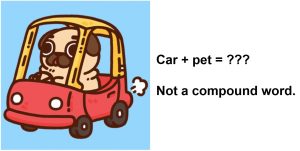
Sometimes the elements of compound words do not seem to have a logical connection. In the case of strawberry, for example, strawberries are not made of or resemble straw. Interestingly, an examination of word origins suggests that in Old English, before the 12th Century, there may in fact have been a natural explanation for naming this fruit strawberry. Students may enjoy exploring this and other seemingly odd compound words at this website:
https://www.merriam-webster.com/wordplay/word-origin-compound-words
Why does it matter?
Understanding compound words has advantages for students in reading, spelling, and oral communication. Learners are sometimes intimidated by longer words they encounter when they find them in texts, use them in their writing, or hear them in speech. Compound words represent a basic form of word building, alongside adding affixes such as plurals or past tense markers, or prefixes and suffixes.
English Language Learners can benefit from understanding that, in compound words, the first syllable is usually stressed, as in classroom or football. This knowledge will aid in pronunciation, but also in comprehending meaning. For example, a greenhouse is a compound word meaning a place where plants are grown, whereas a green house, with the stress on house, is simply a house that is the colour green.
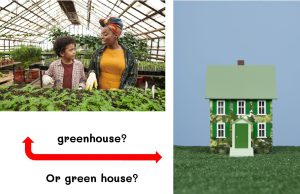
Spelling is enhanced when students understand the logical components in compound words. Instead of needing to memorize a string of 12 letters in breakthrough, they can break the word into two base words of 5 and 6 letters. This is particularly useful when spelling compounds that result in double consonants in the middle, as in earring or teammate. The double consonants are easy to remember when thought of as word equations: ear + ring = earring; team + mate = teammate. Similar examples include bookkeeper, jackknife, granddaughter, and withhold.
In early grades, simple compounds might be sunshine, inside, bathtub, football. As students become familiar with these simple compound words, introduce more complex compound words., such as:
breakthrough; cupboard; database; extraordinary; firefighter; headache; nevertheless; whatsoever
An online source of compounds is “What are Compound Words: Types, Examples, and Lists” https://www.splashlearn.com/blog/compound-words-for-kids/
Note that while most compound words are written as a single word, others may be hyphenated (hands-free; catch-all) or be two separate words (hot dog; ice cream).
How do I teach this?
After reviewing the concept of base words, provide examples of compound words and have students identify the base words within them. Emphasize the meaning connections in most compound words rather than simply having learners find the “little words in the big word.” e.g. Have students see that a chairlift is a lift for a chair. Remember the carwash versus carpet examples above.
Word building: Challenge students to brainstorm compound words related to various categories. This could be a challenge between groups, or each group could be assigned a different category. Students might enjoy brainstorming words connected to their personal interests. Some possible topics and examples are listed below:
Technology: spreadsheet; download; database
Sports: basketball; halfback; blueline; short-stop
Food: cheesecake; cupcake; breakfast; popcorn; cheeseburger; milkshake
Natural Geography: earthquake; Iceland; watershed; quicksand; landslide
Animals/Insects: humpback (whale); hummingbird; swordfish; rattlesnake; grasshopper; seahorse
Some students may benefit from seeing the structure of compound words as a word equation: data + base = database
Word sorts: Provide students with a deck of cards in which each card contains a base word. Challenge them to sort the cards to create as many compound words as possible. A single card could be combined with more than one base word.
e.g. every; some; any; thing; one; where; body
Word explosions : Provide chart paper and have students place a single base word in the centre. Have them add other base words to create as many compound words as possible.
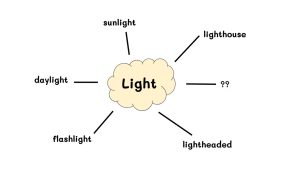
Riddles using compound words: Note with students how word play often uses concepts such as compound words to create humour. These riddles were inspired by online sources such as “115 Tricky Riddles for Kids (With Answers in Case You Get Stumped”: https://www.goodhousekeeping.com/life/parenting/a40910439/riddles-for-kids/
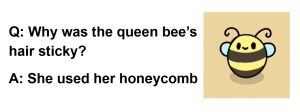

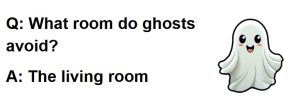
Challenge students to create their own riddles and create a riddle board in the classroom.
………………………………………
Online Resources:
This website provides a useful definition and list of Compound Words
https://www.splashlearn.com/blog/compound-words-for-kids/
Here is a useful ESL Compound Word Quiz Game:
https://youtu.be/dWXqBeEbEvA?si=XtPoMUp9a4bI0s6T
A structural element that forms the foundation of a written word; any unit of a word to which affixes can be added. (e.g., act is the base of acted, action, activity, activate, react). Types of bases include:
bound base. A base that requires an affix to form a word (e.g., -ject in inject and project).
free base. A base that forms a word on its own (e.g., eat, date, weak).

